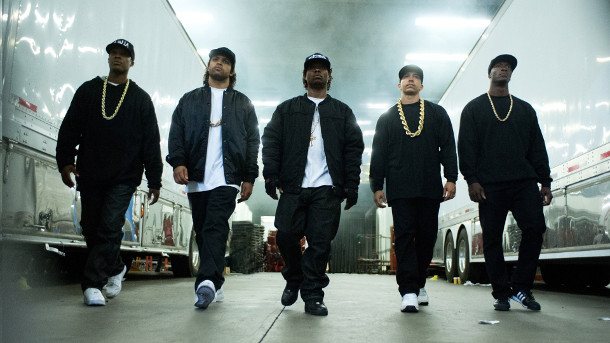Let me be straight. I don't know much about hip hop or rap music. I only have the vaguest notions about the complex and long-running feuds between East and West Coast rappers. The storied history of Suge Knight, Tupac Shakur, and Eazy-E are all fuzzy to me. Thankfully, I have a teenage son to enlighten me on the many narrative twists and turns of the progenitors of gangsta rap, or as the members of N.W.A. refer to it "reality rap."
My son Louis has been awaiting the arrival of Straight Outta Compton in theatres with a barely-contained mania. But the film was rated 18A. What is a mother to do but pay for the tickets and take the boy to see it?
I don't think I have ever seen live flame in a movie theatre, until now. At the culmination of the film, a group of men sitting a few rows down raised their lighters aloft and flicked them open, like you would at a concert. It was an altogether startling moment, but in keeping with the nature of the screening: people talked back to the screen, swearing and whooping and veritably hissing when the villainous Suge Knight appeared to beat the shit out of someone. There was something bizarrely exhilarating about it. I don't know what I was expecting, but it wasn't such an interactive mother-son bonding experience.
Flavour of an era
It is hard not to get swept up in Compton's narrative from the opening shot, set in a nondescript house in South Central L.A. Herein we are introduced to Eazy-E, one Eric Wright (played by the extraordinary Jason Mitchell). Eric/Eazy is a smalltime drug dealer with a massive attitude and a whole lot of Jheri curl. Little E is on the hustle when a business deal is precipitously interrupted by battering-ram-equipped police. Wee Eric barely escapes the raid, scampering over the rooftops into the blazing darkness. Then the film's title slams onto the screen with all the roaring energy of youth and rage. "Whoa..." I muttered. I am a middle-aged white lady, and even I felt the power and seductiveness of this call to arms.
Meanwhile, in another part of L.A., a young man named O'Shea "Ice Cube" Jackson is scribbling into a notebook. When local gang members who don't like being sassed by teenagers interrupt his trip home on the school bus, you hear cadences that will pop up in N.W.A.'s songs. Later on police show up and do almost the same thing, bluing the air with threats of violence and retribution. Young Cube funnels these experiences into words and rhymes, imbued with the colour and flavour of this era of American history.
To its credit, the film's narrative (written by Andrea Berman and Jason Herman) is studded through with references to the late-80s that give it a tang of authenticity. The L.A. riots have yet to happen, but the stage is already set. Gang violence, poverty, drugs and the near-legendary violence of the LAPD have laid groundwork for a conflagration of epic proportions. All it needs is a match.
Like any good music biopic, the pleasure arises in the seeing pieces come into cosmic alignment. So it is here as well. Eazy-E (Mitchell), Dr. Dre (Corey Hawkins), Ice Cube (O'Shea Jackson Jr.), MC Ren (Aldis Hodge) and DJ Yella (Neil Brown Jr.) collide in a particularly satisfying sequence in a local club. When Ice Cube takes to the stage to deliver a blistering version of "Gangsta Gangsta," Dre suggests to Eazy that the music business might be a better option than the drug trade, and so it begins.
The crowd goes wild
Early scenes in the recording studio have a sense of bounce and play that are particularly engaging, especially when Eazy first takes the mic and hits every wrong beat in existence. (As Louis was only too happy to explain, the recording of the group's first hit "Boyz-n-the-Hood" took days to lay down).
As they begin to enjoy some moderate success, with radio play and local notoriety, the music jackals come sniffing around. Jerry Heller (played by Paul Giamatti's hair) is an Iago-like character who becomes the group's manager. Heller promises to open doors for the boyz and so he does. Priority Records (whose previous hit record was the California Raisins) comes on board.
The band's first tour, in support of their album Straight Outta Compton, catches fire, quite literally. At a concert in Detroit, the police state that a performance of "Fuck Tha Police" will result in immediate arrest. As the members of N.W.A. listen in sullen silence to the whitest police officers in the world threaten and lecture, you know what's coming. You want it to, and when the roar of rage coming spilling off the screen and into the audience, you can almost feel every heart in the theatre thunder along in time. "Play the song," you think, and they do. Even as the police, badges held high and batons in hand, push through the crowd, ready to bash heads. The rappers are hauled off to jail, and the crowd goes wild.
If the film had maintained even some small portion of the raw anger contained in this one scene, you would have something incendiary. But alas 'tis not to be. The Shakespearean qualities of the story -- jealousy, greed, pride and ambition -- dissipate into a conventional tale of business. Ice Cube splits from the group over contract disputes. Eazy and Jerry Heller stick together. Dr. Dre hooks up with Suge Knight to form Death Row Records. The various factions lob word bombs at each other, much to the delight of fans. Police brutality and long-simmering social injustice are sent to the sidelines, while the business of making money takes centre stage.
It is here that the film begins to sag, weighed down with too many beefs and shady dealings. Even the introduction of Snoop Dogg and Tupac Shakur avatars does little to liven things up. There's talk of an N.W.A. reunion without the interference of Jerry Heller or Suge Knight, then the film takes a final swerve into unexpected pathos as Easy-E succumbs to AIDS-related complications. He died at age 31.
As Louis wiped away tears, and the boyz in the front row raised their lighters in tribute, the film's final coda rolled. Here the original track in all its raging glory returns and you remember all over again what music can do. All you really need is contained in those four minutes and 26 seconds. There is a reason kids of all stripes and colours still listen to a song recorded almost thirty years ago. Not much has changed.
Missing histories
If you would like to see the reality of current L.A. folk, people who are still desperate, still poor, and still hustling, then seek out Tangerine. I saw it a few weeks ago, and it has stayed with me. As with the early songs of N.W.A., the language and cadence of poverty, oppression and struggle are compelling beyond belief. There is a ragged poetry that sings and struts, composed of pride, pain and boastfulness, blue as smoke but possessed of some siren's call of veritas -- it is a thing of beauty.
Straight Outta Compton has been examined and reviewed from many perspectives. One of the best is Wesley Morris's take for Grantland. Mr. Morris hits the nail on the head about the film's final message, embedded in the tail credits, as each of the remaining members is cited for their post-N.W.A. success. It is a virtual advertisement for Dr. Dre's billion-dollar business empire and Ice Cube's film career. (DJ Yella's career directing porn films is curiously omitted.) Money makes everything better is the final ringing endorsement. Even back in the day, it was clear the members didn't want to be standard bearers for a race revolution, they were only to happy to buy houses in the suburbs and big cars.
There are other even more problematic aspects to the film, namely the erasure of N.W.A.'s history of misogyny and violence against women, especially Dr. Dre's assault on Dee Barnes. In a widely shared piece written for Gawker, Ms. Barnes eloquently sums up this missing history, both hers and N.W.A's, to give much more inclusive picture. The role played by women rappers of the era is simply disappeared. This may be one of the most egregious of sins of omission, but even before the film made it into theatres, it was clear from the casting call the film's attitude towards women. I am still struggling with my feelings about it, as a woman and a mother of a rap fan. How to talk to your son about the fact the women on screen are largely irrelevant, except as nagging mothers, naked party favours or scheming girlfriends. I haven't quite figured this one out yet. Maybe because I feel complicit.
Director F. Gary Gray has a distinctly workmanlike approach, but is entirely too cautious, too careful to make something that might actually challenge the revisionist history, bordering on hagiography. Given the players involved, it is understandable to tread so carefully, but it makes ultimately for unsatisfying cinema. Jerry Heller threatened to be in attendance on the film's opening day with his lawyer, and Suge Knight allegedly killed someone near the set.
Still, despite the controversy, or maybe because of it, the film is going gangbusters in theatres at the moment, and it's not hard to see why. Everyone loves defiance. Sometimes, I think it is one of the best qualities that humans possess. But here it shaped, packaged, and sold. Stamped with a parental advisory sticker that makes it seem slightly risqué. You can know this, understand this, and still get suckered.
As Wesley Morris points out this is a film that is almost afraid of itself, or maybe more correctly, of current racial relations. After more than a year of police killings of young unarmed black boys and men, you think that it would only take one spark to set things off. The film version of Straight Outta Compton doesn't even come close. But the record might still have a fighting chance. ![]()
















Tyee Commenting Guidelines
Comments that violate guidelines risk being deleted, and violations may result in a temporary or permanent user ban. Maintain the spirit of good conversation to stay in the discussion.
*Please note The Tyee is not a forum for spreading misinformation about COVID-19, denying its existence or minimizing its risk to public health.
Do:
Do not: